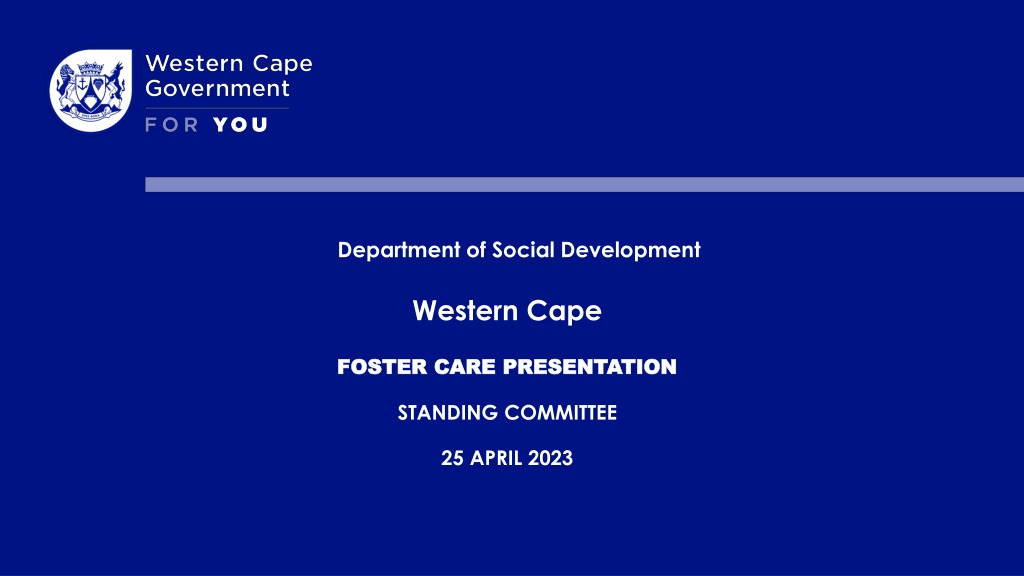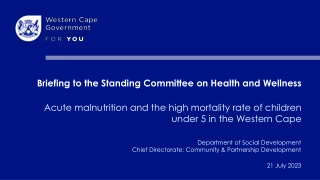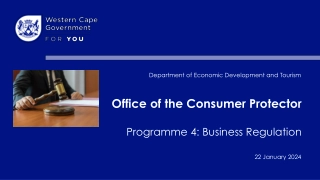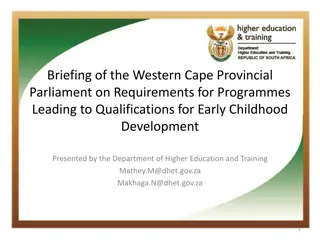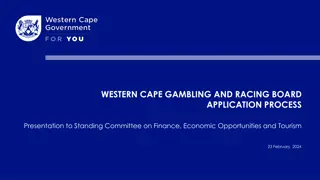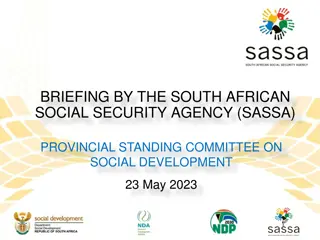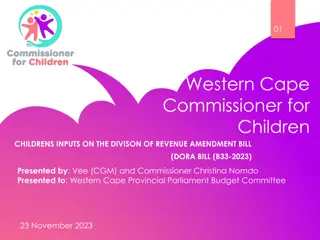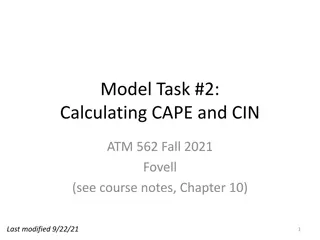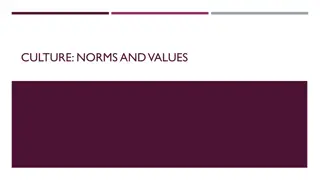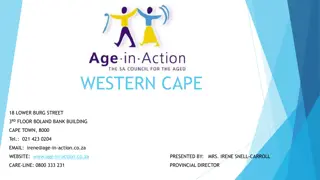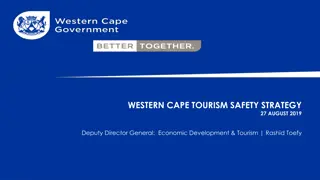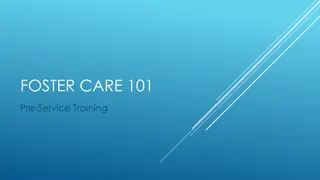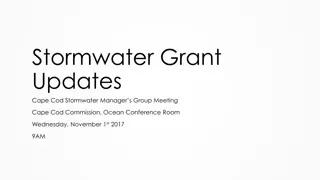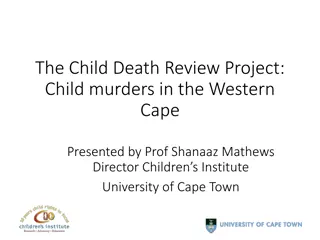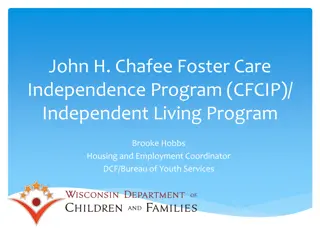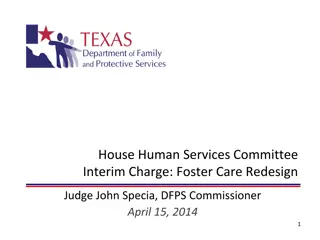Foster Care Management and Norms in Western Cape: Legislation, Policy, and Standards
The presentation discusses the foster care management in Western Cape, focusing on legislation compliance, norms, standards, and challenges. It covers aspects like foster care orders, Canalisation SOP, human resources, child protection organizations, funding, and more. The strategic implementation of the Children's Act 38 of 2005 plays a crucial role in ensuring the well-being and rights of children in foster care.
Download Presentation

Please find below an Image/Link to download the presentation.
The content on the website is provided AS IS for your information and personal use only. It may not be sold, licensed, or shared on other websites without obtaining consent from the author. Download presentation by click this link. If you encounter any issues during the download, it is possible that the publisher has removed the file from their server.
E N D
Presentation Transcript
Department of Social Development Western Cape FOSTER CARE PRESENTATION FOSTER CARE PRESENTATION STANDING COMMITTEE 25 APRIL 2023
CONTENTS FOSTER CARE MANAGEMENT 1. Foster Care Management Legislation, Policy and Procedures & Canalisation Standard Operating Procedure (SOP) 2. Foster Care Norms and Standards 3. Cluster Foster Care Norms and Standards 4. Foster Care Plan of Action with the Implementation of the Amendments of the Children s Act 38 of 2005 5. Foster care baseline of children in foster care 6. Human Resources, Foster Care Monitoring Tool and s125 (Access to the CPR) 7. Challenges and Mitigating Factors 8. Designated Child Protection Organisations and Funding. 9. Conclusion 2
TABLE 1. FOSTER CARE MANAGEMENT LEGISLATION, POLICY AND PROCEDURES ACTIVITY OUTPUT PLANNED INTERVENTIONS CHILDREN S ACT 38 OF 2005 Statutory compliance to the CA and Canalisation SOP, to reduce the risk of litigations, and serve the best interest of children. The Western Cape Province fully implements the Children's Act 38 of 2005 by all role players in the foster care management system. All foster care orders are extended via the DOJ&CD in terms of S159 or s186 foster care orders. All other foster care notices are issued via DSD Canalisation Services. CANALISATION STANDARD OPERATING PROCEDURE (SOP) Canalisation Standard Operating Procedure manual is aligned to the Children s Act 38 of 2005. The implementation of the standardized foster care process is monitored and guided by the Canalisation SOP. Canalisation officers are appointed and received appointment letters for until 31 March 2024. Provincial canalisation training is scheduled for May 2023 and October 2023 to ensure standardisation and compliance with the statutory prescripts; Canalisation SOP/ Children s Act 38 of 2005 in the Province. A canalisation Officer is a designated child protection social worker in the employ of the Department of Social Development (DSD) who administers and regulate the stay, movement and exit of children in the alternative care system. In terms of Chapter 11 of the Children s Act the Head of Department for Social Development(HOD) has certain powers and duties, which is delegated to canalisation officers in terms of S311 of the Children s Act 38 of 2005. 3
TABLE 2. FOSTER CARE NORMS AND STANDARDS ACTIVITY NORMS STANDARDS FOSTER CARE NORMS AND STANDARDS Placement with a family that closely matches(race, culture, language, religion) the family of origin. The child to participates in decisions affecting him/her. Designated Socaila worker informs the family/guardian/parents/caregiver through a agreed upon process of decisions. Foster parents are recruited, screened and trained. Child and Foster parents are appropriately matched. Develop a foster parent database An investigation into the circumstances of the child and his/her family must be conducted within 90 days from when the case was reported. A comprehensive report must be provided according to the prescribe format (F38). A child has the right to live in a family The child has the right to participate in decisions affecting him/her. Children have the right to be placed with suitable foster parents All children are entitled to a comprehensive investigation that assesses and evaluates the circumstances before a decision is made to remove the child from parental care. All children in foster care must have a Permanency Plan, Foster care Plan and Individual Care Plan A Permanency Plan must be developed in the prescribed format specifying why the child cannot return to the care of his/her family of origin and what needs to be achieved and services to be provided for the child to be reunited with his/her family. The foster care placement is finalized through a court process which upholds the best interest of the child. The Children Court Inquiry report is submitted to court. The court proceedings must be attended by the social worker, the child, parents/caregiver/ guardian and prospective foster parent 4
TABLE 2. FOSTER CARE NORMS AND STANDARDS ACTIVITY NORMS STANDARDS FOSTER CARE NORMS AND STANDARDS Ongoing trainings of foster parents to be provided. Support groups for foster parents to be conducted. All foster parents must receive ongoing support and capacity building. A child in foster care has the right to financial, educational and medical support from the state. The payment of a foster child grant via SASSA. A child in foster care is exempted from paying school fees in a government school. Access to medical care via government community health care services. Foster care plan and individual development plans must be compiled by the foster care social worker A child has the right to interventions that are appropriate to his/her age, maturity and developmental needs. A child may be transferred, provincially or discharged from alternative care if it is in the best interest of the child. Written Notices (s171, s173, s175) can be issued by Canalisation Services as per Delegation by the HOD. Children without parents have the right to be permanently placed. Foster parents have the right to adopt a child in their foster care through lodging an application. An orphan/abandoned child may be adopted. The responsibilities and rights of foster parents must be maintained. The responsibilities and rights of foster parents must be included in the Foster Care Plan. 5
TABLE 2. FOSTER CARE NORMS AND STANDARDS ACTIVITY NORMS STANDARDS FOSTER CARE NORMS AND STANDARDS Guidelines are stipulated in Regulation 57. Form 39 (Reg 57 (1)) Healthy, hygienic and safe environment (Reg 57 (2)) Adequate nutrition and sleeping facilities Suitability of the care giver/foster parent Children must live in a safe, healthy, well- maintained environment which meets their basic needs in terms of their privacy, safety and well- being. A child is entitled to remain in alternative care until the end of the year in which such a child reached the age of 18. An application requesting extension of the order must be made three months prior to the child turning 18. The HOD via canalization services may extend the order up to end of the year when the young person reaches the age of 21 years. An application for the continued payment of the FCG must be made via SASSA. Children have the right to be re-united with their families Reunification services must be conducted as outlines in the foster care plan. Reunification services must be prioritized where the possibly exists. Reunification plans must be compiled by the SW regarding the current circumstances of the biological parents specifying if/why reunification is/not possible when the court order is extended or if discharged from the foster care system. 6
TABLE 3. CLUSTER FOSTER CARE NORMS AND STANDARDS ACTIVITY NORMS AND STANDARDS CLUSTER FOSTER CARE NORMS AND STANDARDS In Chapter 12 of the CA Cluster Foster Care is defined as the reception of children in foster care in accordance with a cluster foster care scheme registered by the provincial head of social development . Only organisations based in the Western Cape, operating under their own NPO registration number, be considered for approval by the head of the provincial Department of Social Development to manage a cluster foster care scheme. MODEL C In the Western Cape, we apply Model C as recommended by NDSD whereby children are placed in the Cluster Foster Care Schemes, which is community based. LEGISLATION All Cluster foster care schemes must be registered i.t.o Section 183(1)(C)(ii) of the Children s Act 38/2005. Only registered NPOs (designated as CPO s) may manage and provide Cluster foster care schemes. REGISTRATION AND DESIGNATION Only organisations that have been approved by the Provincial Head of Social Development may manage and provide Cluster Foster Care Services (Signed Form43 by HOD). All Children placed in the CFC scheme must be placed on valid foster care orders. Each house within the scheme to accommodate a maximum of 6 foster children. (Except if S185 is applicable) RECRUITMENT, SCREENING, VETTING AND TRAINING OF PERSONS WORKING WITH THE CHILDREN PLACED AT THE SCHEME All persons working with children in cluster foster care schemes must be fit and proper (S182) - physically, mentally and psychologically competent. All persons in the life space of children in the CFCS must be checked against the CPR using form 29 or Form 30. No person whose name appears in the Part B of the CPR may work with children. Persons convicted of murder, attempted murder, rape, indecent assault or assault with the intent to do grievous bodily harm are unfit to work with children. 7
TABLE 3. CLUSTER FOSTER CARE NORMS AND STANDARDS ACTIVITY NORMS AND STANDARDS RIGHTS OF CHILDREN All Cluster foster care schemes must uphold the rights of children. A file must be kept at the Organisation Managing the CFCS and at each foster home where a specific child is placed containing the following documentation: - A copy of each child s valid court order - Birth certificate / ID Document - Health /Clinic cards The responsibility for the care and protection of the child in the CFCS must be assigned to an individual active member / care giver. Children in alternative care may remain in such care beyond the age of 18 years old. [Sec 176(1) & Sec 176(2) notification]. A CFCS must promote the best interest of the child in the CFCS by providing services appropriate to the developmental needs of the child. CLUSTER FOSTER CARE NORMS AND STANDARDS Service must include but not limited to: Protection of rights, Social Services, Education and ECD, Health, Mental health Services, Cultural and religious services , Service to children with special needs, including chronic illness or a disability. - DIFFERENT PLANS FOR FOSTER CHILDREN Every child in the CFCS must have: A permanency plan upon admission and assessed two months after placement and every six month thereafter. Foster care plan must be developed within 21days after placement of the child and assessed on a six monthly basis. An IDP must be develop and assessed on a six-monthly basis A plan for independent living must be included in the permanency plan when a child turns 15 years old. - - - - - SW in CFCS to facilitate and assist in ensuring that all above is in developed, assessed and available. TRANSFERS The transfer for children from foster care parents(active members) to the Schemes must be done according to the procedures as outline in the act (Sec 171). 8
TABLE 3. CLUSTER FOSTER CARE NORMS AND STANDARDS ACTIVITY NORMS AND STANDARDS SOCIAL WORKER in CFCS A social worker must be employed by a CFCS for every 35 children placed. All registered and designated CFCS are funded with a social work post(s) depending on the size of the scheme. A child in the cluster foster care scheme has the right to financial support from the state. Payment of the foster child grant to the NPO managing the cluster foster care scheme. Children placed in alternative care are exempted from paying school fees and medical fees/costs. FUNDING NPO/CFCS All cluster foster care schemes must adhere to the operational norms and standards. An annual report must be submitted as prescribe in * regulation 69(2). A quarterly updated register of all children placed in the CFCS to be submitted to Provincial DSD. The scheme must undergo a quality assurance process within a year of registration and annually thereafter. All registered, designated and funded cfcs in the Province adheres to the provincial standard operating procedures of the funding process. 9
TABLE 4. PROVINCIAL ACTION PLAN TO IMPLEMENT THE CHILDRENS AMENDMENT ACT ACTIVITY PROGRESS MADE TO DATE PLANNED INTERVENTIONS Implementation of the CSG Top- Up Grant Provincial SASSA provides DSD with a list of all applications per month. DSD coordinator sends the list to the regions for investigation and assessment to determine if any of the children on the list are Children in need of care and protection . Ongoing Extension of the jurisdiction of the Children s Courts regarding guardianship. Liaising with DOJ&CD regarding these applications. Social workers to be trained to conduct suitability assessments and present suitability reports of suitable guardians to court. Development and conducting of quality assurance process for the evaluation of child protection services and child protection organisations. Prescribing the powers, duties, and responsibilities of the Registrar of the National Child Protection Register. Provincial M&E Teams monitors designated child protection organisations in the province. Canalisation units are responsible for the quality assurance for child protection services. To increase the number of canalisation officers to strengthen the child protection and foster care services. s125 of the Children s Act 38 of 2005 is fully implemented in the Western Cape to screen the suitability of applicants requesting to care for children in the alternative care system ensuring that the applicants' names do not appear on Part B of the National Child Protection to expedite Children s Court processes. Ongoing Establishment of well-resourced child protection units The province is resourced with child protection units per service delivery area in DSD and DCPOs rendering childcare and protection services. Ongoing 10
TABLE 4. PROVINCIAL ACTION PLAN TO IMPLEMENT THE CHILDRENS AMENDMENT ACT ACTIVITY PROGRESS MADE TO DATE PLANNED INTERVENTIONS Providing that a children s court may extend an alternative care order that has lapsed by issuing an interim order. Awareness and capacity building is to be provided to all the stakeholders involved in the value chain (e.g., Social Service Practitioners, etc.) Ongoing Providing regulations regarding the procedure, form, and manner that a social service practitioner must follow when assessing, screening, investigating, referring to the relevant authority, and placing a child who is in need of care and protection. Development of the regulations and procedures for risk determination assessment and referral procedure for investigations and procedures to determine whether a child is in need of care and protection (Child Protection Manual) Capacitate all the stakeholders involved in the childcare and protection value chain. Assessment and investigation of children at risk by the social workers to determine if they need care and protection. Work in progress Registration of Cluster Foster care Schemes All CFCS are registered in the WC. Registration Certificates are issued and signed off by the HOD with the specify the addresses of the homes. A Cluster Foster Care Management Plan is in place. CFCS are monitored annually in collaboration with the Provincial M&E Team and the Provincial Foster Care Programme Assessment reports are compiled following the annual assessments SDIPs are in place where applicable. Ongoing 11
TABLE 4. PROVINCIAL ACTION PLAN TO IMPLEMENT THE CHILDRENS AMENDMENT ACT ACTIVITY PROGRESS MADE TO DATE PLANNED INTERVENTIONS Providing that not more than six children may be placed in foster care with a single person or two persons sharing a common household in terms of a registered cluster foster care scheme. This norm and standard are implemented in cluster foster care schemes in the Western Cape. Norms and standards for CFCS are implemented and adhered to in terms of the number of children per house in the scheme, vetting of all carers/social workers/staff of the scheme, etc. Ongoing Strengthening the implementation of section 186 by providing that a children s WCDSD promotes the implementation of s186 orders in the province with the increased monitoring of once a year via regional and provincial engagements where DCPOs are also present. Highlighted at the case flow meetings with DOJ&CD 12
TABLE 5. FOSTER CARE BASELINE OF CHILDREN IN FOSTER CARE IN THE WESTERN CAPE MARCH 2023 ACTIVITY OUTPUT ANALYSIS OF THE FOSTER CARE BASELINE OF CHILDREN IN FOSTER CARE WESTERN CAPE FOSTER CARE BASELINE A breakdown of the 39 363 foster children is as follows: 26 478 foster children are on short-term foster care orders in terms of s159 of the Children s Act in the care of foster parents. 10 515 foster children are on long term foster care orders in terms of s 186 of the Children s Act in the care of foster parents. The total of 39 363 foster children includes the 302 children who are cared for in cluster foster care schemes. The total number of young persons in alternative care in terms of s176 of the Children s Act accounts for the balance of 2 370. Table 4 reflects the total number of foster children and young persons in alternative care currently in the Western Cape is 39 363. Approximately 70% of the children in foster care currently are placed in terms of s159 court orders which has impacted the province s management of foster care orders as social workers are required to take these children s matters to the Children s Court for the extension of their foster care orders every 2 years. It is surmised that, with the amendment of s186 of the Children s Act, the number of s186 court orders may increase in the future, which will not only impact monitoring services to these children positively but will also alleviate the statutory burden created by the two-year extension applications. The WCDSD follows a specialized model in foster care whereby 245 social workers are dedicated to foster care services which have allowed a reduction in the foster care backlog successfully over the years. However, it is important to note that there has been a decrease in social workers during this reporting period due to the high staff turnover in designated child protection organisations. In addition, the constant influx of new foster care cases places an enormous strain on the human resources of the WCDSD, making it difficult for the WCDSD to meet the ever-increasing demand for foster care services. 13
TABLE 5: TOTAL NUMBER OF CHILDREN IN FOSTER CARE ACCORDING TO TYPE AND DURATION OF FOSTER CARE ORDERS AT END OF MARCH 2023 REGION TOTAL NUMBER OF CHILDREN IN FOSTER CARE ACCORDING TO TYPE AND DURATION OF FOSTER CARE ORDERS AT END OF MARCH 2023 TOTAL RELATED UNRELATED CLUSTER FOSTER CARE Sec 159 Order Sec 186 Order Sec 176 Sec 159 Order Sec 186 Order Sec 176 Sec 159 Order Sec 186 Order Sec 176 METRO SOUTH 2 787 1 502 121 1 611 622 42 63 8 3 6 759 METRO NORTH 2 912 1 253 5 1 243 314 5 32 0 0 5 764 METRO EAST 2 443 2 253 670 1 027 824 293 61 2 2 7 575 CAPE WINELANDS 4 319 1 046 265 2 224 476 144 81 9 2 8 566 EDEN KAROO 3 054 876 479 1 050 432 160 30 7 2 6 090 WEST COAST 2 577 486 117 964 405 60 0 0 0 4 609 SUB-TOTAL 18 092 7 416 1 657 8 119 3 073 704 267 26 9 39 363 Out of the total of foster children provided above, please provide a number of those that are not receiving Foster Child Grants: ___________ Only the signed pdf document is a true and valid report from the Western Cape 14
TABLE 6. HUMAN RESOURCES, FOSTER CARE MONITORING TOOL & S125 ACTIVITY PROGRESS MADE TO DATE PLANNED INTERVENTIONS Human Resources WC DSD has increased human resources over the last financial year and will continue to fill the vacant posts pending the availability of funds to ensure the human capacity and the tools of trade are adequate to manage foster care in the province. Foster care social workers= 245 Generic social workers= 433 Social work supervisors=108 Canalisation officers= 32 Social auxiliary workers= 264 Implementation of the web based foster care monitoring tool. The Foster Care Web-based Monitoring Tool (FCWBT) is fully implemented in the Western Cape. All foster care cases are loaded on the FC web-based monitoring tool. The FCWBT system positively serves its purpose by sending weekly automated reminders to social workers regarding orders due to lapse and expired orders for their priority attention. Managers, Supervisors and Canalisation Officers in the regions and the province at large have access to the Foster Care Web-based system to monitor, track and ensure the extension of foster care orders on a weekly/monthly basis. Canalisation officers send reminders to supervisors regarding lapsed and due to lapse orders to ensure foster care extension reports are timeously submitted to the Children s Courts. s125 of the Children s Act 38 of 2005, is fully and successfully implemented in the Western Cape by DSD and DCPOs as of 01 December 2021. The current foster care baseline in the WC is 39 363. Social workers in DSD and DCPOs maintain the weekly capturing of new foster care cases on the Foster Care Web-based system. Implementation of S125 by the WC Provincial DSD. The ongoing implementation of s125 of the Children s Act 38 of 2005 positively supports the extension of foster care orders in the Western Cape. 15
TABLE 7. CHALLENGES CHALLENGES 1. DOJ&CO a) Magistrates vary in their interpretation and application of the Children's Act 38 of 2005 regarding MITIGATING FACTORS DSD liaises with DOJ&CD to timeously obtain court dates and court orders for the extension of section 159/186 foster care orders. It is recommended that the DOJ&CD issue foster care extension orders a month before the court orders lapse to duly submit valid court orders to SASSA to eradicate the foster care backlog. the extension of foster care orders. This results in the fact that courts differ in their requirements for extending foster care orders. The lack of uniformity amongst magistrates thus hinders the granting of extension orders. b) The rotation of magistrates and vacant magistrates/other court officials posts, staff turnaround, and language barriers at times result in the postponement of foster care cases, impacting the flow of foster care orders being issued. Resolutions on these matters would minimize postponements and timeously expedite foster care orders. c) Court orders are unclear, incorrect, or incomplete when handed down. The process of varying the said orders is time-consuming for the WCDSD but is an essential process as SASSA rejects the orders and refuses to process the flawed orders. Such matters are regarded as unfinalized and therefore become part of the foster care backlog. d) Social workers file foster care extension reports with the Children s courts prior to the date on which the court order will lapse but are still subjected to prolonged waiting periods for court dates and court orders. 16
TABLE 7. CHALLENGES CHALLENGES MITIGATING FACTORS 2. The Department of Home Affairs (DHA) The prolonged timeframe for issuing birth certificates and unabridged birth certificates by the The WCDSD has through its concerted efforts in this regard established a positive Department of Home Affairs continues to compromise the payment of foster child grants, which working relationship with the Department of Home Affairs resulting in the recent impacts the stability, safety, and quality of life of children in foster care. issuing of birth certificates for children in alternative care. The WCDSD and DHA now meet quarterly regarding late birth registration applications. The WCDSD will continue to strengthen this positive working relationship with the Department of Home Affairs in the best interests of children. 3. Inter-Provincial Transfers a) Undocumented inter-provincial foster care transfers contribute to the foster care backlog The WCDSD collaborated with SASSA regarding these undocumented inter- statistics due to foster families moving in and out of the Western Cape without informing provincial transfers that continued to reflect on the SASSA list for the last two social workers, resulting in undocumented transfers. years. SASSA has as of November 2022 implemented stop payments of foster child grants, to trace foster children. b) In most of these undocumented transfers, the WCDSD needs to open new Children's Court Inquiries to safeguard and protect the affected children, which forms part of the workload The process is initiated when DSD informs SASSA that the foster family is and ultimately contributes to the foster care backlog in the province. untraceable. The foster parent is from the date of reporting given a 3-month period to report to the nearest SASSA local office for reinstatement of the grant, c) SASSA legislation allows beneficiaries to access the foster child grant anywhere in South failing which the grant will lapse. Africa. This contributes to undocumented inter-provincial transfers. d) Inter-provincial transfers also impact the SASSA list. These cases often remain on the SASSA list for long periods as these foster families do not report to SASSA in the new province, contributing to the foster care backlog in the Western Cape. 17
TABLE 7. CHALLENGES CHALLENGES MITIGATING FACTORS 4. High staff turnover in Designated Child Protection Organisations Additional funding has been made to the identified DCPOs 5. Violence and hijacking of social workers / vehicles in certain hotspot areas. Liaise with SAPS and Community leaders to access certain areas when it is safe to render social work services 6. High Foster Care Caseloads- Average: 160 cases per social workers Require more foster care social workers / to increase human capacity to manage 39 363 children in foster care in the WC. 7. Clients fail to inform social workers when the move house Attempts to locate children via SASSA processes. 8. Challenges to locate foster families in informal settlements as clients are mobile. Ongoing searches to locate children families despite contracting with clients. 18
TABLE 8 . Designated Child Protection Organisations and Funding. DESIGNATED CHILD PROTECTION ORGANISATIONS (DCPOS) Number of DCPOs 120 Funded DCPOs to render Child protection/ Foster Care Services 120 Funded Posts Social Work Managers 6 Social Work Supervisors- 69 Social Workers - 495 Social Auxiliary Workers 240 Community Developments Assistants - 35 Admin workers- 107 Budget Allocation R 199 467 799 19
TABLE 9 . CONCLUION CONCLUSION The WCDSD acknowledges the fact that consistent collaboration between all the relevant role players is vital to the continued reduction of the foster care backlog and the management of foster care in the Western Cape. The amendments to the Children s Act 38 of 2005 will provide comprehensive legal solutions to the management of foster care in that the number of children entering the alternative care system will be reduced and the risk of a foster care backlog will be mitigated. The WCDSD remains committed to the Provincial Foster Care Management Plan and will implement the amendments to the Children s Act 38 of 2005, appealing to all its stakeholders and key government departments to support the WCDSD. 20
